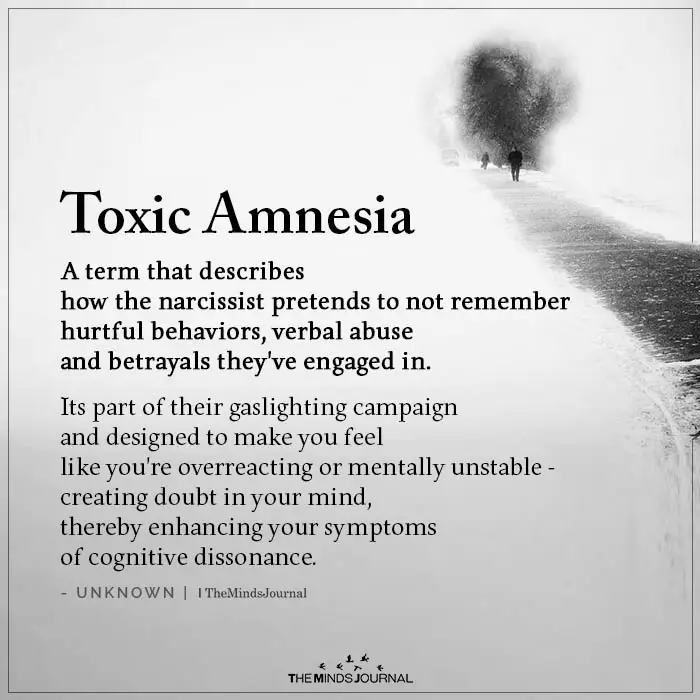Narcissism and denial often go hand in hand. Narcissists strategically use denial as a psychological tool to retract, disprove and debunk certain things they might have said or done. Narcissistic denial can also be used to make you question your own sanity.
Denial is a brainwashing strategy
A narcissist can use denial to bait or provoke you and trigger a negative response from you. The moment you stand up for yourself or react out of anger, they then use your response to make you seem like the abuser. This can make you feel shame, guilt, and confusion about your own thoughts and perceptions.
Narcissistic denial is a manipulative technique that abusers use to dominate you and make you do what they want. By constantly abusing and insulting you and then denying it, narcissists make you question yourself and instill extreme self-doubt and low self-esteem. Denial is also used to condition and brainwash you as well.
Author Jackson Mackenzie explains that narcissists often intentionally say and do certain things that they are sure will trigger a reaction out of you.
He writes “When you react, they’ll turn the tables and blame you for misunderstanding. Often, they’ll even deny that they ever said it. This is called gaslighting – blatantly doing or saying something, and then blaming the other party for misinterpreting it (or denying that it even took place).”
They use gaslighting as a brainwashing technique to make you doubt your own reality.
Related: Denial: A Serious, Invisible Problem
Narcissistic denial & delusion
A narcissistic person is often delusional. Whether they are your parent, boss, coworker, or partner, a narcissist will never own up to their mistakes and will refuse to take responsibility for their negative behavior and actions. Narcissism and denial of reality go hand in hand.
Narcissistic delusion happens when they constantly deny saying or doing something even though there may be evidence to prove otherwise. They will deny all the flavors you did for them, deny what they did to you, deny events that happened, deny conversations that took place, deny their behavior and even reality if needed.

Narcissistic denial is a conscious and constant practice that can even start to affect the narcissist’s reality. Intentionally denying the truth can make them believe in their lies so strongly that they may become disconnected and detached from reality.
As denial becomes their new reality, narcissists can often experience delusion.
Author and certified coach Darius Cikanavicius explains “People with strong narcissistic tendencies are highly delusional. That’s why having a conversation with them can be incredibly frustrating.”
Gaslighting and narcissistic denial
Narcissistic denial is a form of gaslighting which is a psychological manipulation technique used by abusers to gain and maintain emotional control over you.
It can be used by a narcissist to manipulate events and surroundings to make you doubt yourself and your beliefs. It is a symbol of an abusive relationship and can occur in different types of relationships, like friendships, families, marriages, and in workplaces.
According to therapists Andrea Papin, RTC, and Jess Jackson, LMT, gaslighting is used by abusers to “gain an upper hand and avoid accountability.”
This brainwashing technique is mostly used by covert narcissists. They use gaslighting to play mind games that make you second guess your experiences and make you vulnerable to their suggestions.
This is why it can often be difficult for the victim to realize if they are experiencing this manipulation strategy.
Therapist Aki Rosenberg, LMFT, says “Gaslighting at its core is always about self-preservation and the maintenance of power/control.” It gives the abuser the power and control to create and maintain a narrative that makes you appear wrong and makes them seem perfect.
Related: 8 Lies You Start Believing When An Abusive Partner Is Gaslighting You
What narcissistic denial looks like
As it is often difficult for the victim to identify denial and gaslighting, they can easily fall victim to the brainwashing strategies of the narcissist. They are experts in denial.
Whether men or women, they will say one thing and then do the complete opposite. They are pathological liars who will deny the truth to your face.

An abusive narcissist may use the following sentences and phrases while implementing narcissistic denial and gaslighting:
- “I never said anything like that.”
- “You are being too dramatic.”
- “You always misunderstand me.”
- “That’s not what I meant.”
- “I am only trying to help/protect you.”
- “You overthink everything.”
- “I think you should calm down, you’re being over-sensitive.”
- “Why can’t you just believe me?”
- “I did it for your own good.”
- “I think you’re crazy.”
- “Why do you always over-analyze things?”
- “I think you’re losing it. You seriously need professional help.”
- “Why are you angry all the time?”
- “I don’t understand why you think/feel that way.”
- “Are you sure you’re not imagining things?”
- “I don’t really understand where you come up with this stuff.”
- “How come you are allowed to react like this but I am not?”
Malignant narcissists are more likely to make a statement openly in front of you and then directly deny it later in public or private. The more paranoid, aggressive, and antisocial your abuser is, the more they will engage in narcissistic denial.
Coping with narcissistic denial
So, how to break narcissistic denial and protect yourself from narcissistic abuse?
“Gaslighting is a form of persistent manipulation and brainwashing that causes the victim to doubt her or himself, and to ultimately lose one’s own sense of perception, identity, and self-worth,” says author Preston Ni M.S.B.A.
Your narcissist will always base their accusations and statements on intentional falsehoods to make you question your sanity. This is why it is crucial that you work on building your own self-esteem, sense of self, and self-confidence in order to cope with the adverse effects of their manipulation and brainwashing.
“Recognizing that you’re a victim in your relationship is the important first step toward getting help,” explains Healthline.
Once you can identify the signs that you are dealing with a narcissist and that they are psychologically and emotionally abusing you, you can seek professional help to start the healing process.
Related: 121 Things Narcissists Say When They’re Gaslighting You
If you feel like you’re in narcissistic abuse denial, then consulting a mental health professional, like a therapist, psychologist, or psychiatrist, will help you gain coping skills, reduce your self-doubt, manage anxiety, and understand the true reality of your abusive experience.











Leave a Reply
You must be logged in to post a comment.